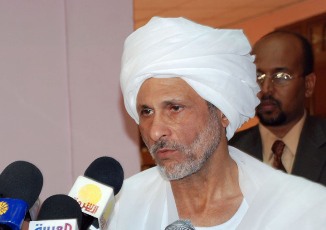Sudan’s presidential aide declines to lead “Islamic Movement” – sources
November 18, 2012 (KHARTOUM) – Sudan’s prominent Islamist and presidential adviser, Ghazi Salah Al-Deen Al-Atabani, has decided not to vie for the position of the secretary-general of the Islamic Movement (IM) despite his strong chances of winning, sources told Sudan Tribune as the state-linked organization concluded its 8th General Conference on Saturday.

These amendments, the sources said, established an IM’s Supreme Council consisting of top-level government officials, which means that the organization “has been conflated into the government” one source said.
According to the sources, Al-Atabani enjoyed great chances of winning the position and that the majority of members expressed willingness to elect him.
However, the intellectual Islamist eventually decided not to run for the position due to interferences by influential government figures who pushed through amendments he opposes, the sources added.
Among the amendments introduced is the creation of a Supreme Council to be chaired by members of the highest executive authority in the IM, meaning President Omer Al-Bashir and his deputies.
Another amendment made is that the IM shall only be dissolved if 70 percent of the participants of the next General Conference, due to be held after four years, voted to do it on the condition that the event must enjoy a quorum of 80 percent attendance.
The conference also ended internal disagreements on whether the secretary-general should be elected during the conference itself or by the 400-member Shura Council it elects. It was finally decided that the secretary-general will be elected by the Shura council after 1,800 conference participants voted for this proposal while only 600 members voted for electing the secretary-general by conference participants.
The newly-elected Shura Council is due to hold its first meeting on Sunday evening and elects the new secretary-general.
It is not clear which amendments exactly Al-Atabani objected to but he did not publicly announce his intention to the run for the position held by Vice-President Ali Osman Mohammed Taha.
Insiders say that Al-Atabani, who also heads the parliamentary bloc of the ruling National Congress Party (NCP), has recently stepped out of decision-making circles due to what they described as his unhappiness with the way the NCP has handled a number of sensitive issues lately.
He was fiercely critical of the government’s response to the resolution issued on 24 April by the African Union Peace and Security Council (AUPSC) over the situation between Sudan and South Sudan following their brief war in the same month around the border oilfields of Heglig.
Al-Atabani publicly criticized the government for accepting the resolution and its subsequent referral to the UN Security Council (UNSC), basing his objections on what he described – in an op-ed published by the daily Sudanese newspaper Al-Intibaha on 30 April – as the introduction into the AUPSC resolution of articles biased in favor of South Sudan and against Khartoum by the international community.
New IM secretary-general elected
The newly elected IM’s Shrua Council held its first meeting on Sunday evening and elected former finance minister Alzubair Ahmad Al-Hassan as secretary-general uncontested. The Shura Council also elected Mahdi Ibrahim as its chairman following strong competition with former health minister Abdulla Sid Ahmad
IM conference marred by criticism of government
The IM conference witnessed the emergence of strong criticisms among Islamists against the performance of executive and legislative authorities and their dealing of political and economic crises.
A number of participants called for electing professional members to lead the IM and the NCP in order to extricate the government from what some of them described as the clutches of corruption and nepotism.
The Islamic Movement (IM) was created by the NCP following the 1999 schism with its former leader Hassan Al-Turabi and his supporters who formed the Popular Congress Party (PCP).
The IM was designed to exist as a parallel and broader political base to support the Islamist orientation of the NCP regime and rally Sufi and radical Islamist groups under its umbrella, while excluding the PCP.
The IM conference was held on 16 and 17 November at the Friendship Hall in Khartoum with the participation of 4,000 members. The opening session was also attended by a number of prominent foreign Islamists including Khalid Mishal, the leader of the Palestinian militant organization Hamas, and Rashid al-Ghannushi, the leader of Tunisia’s Ennahda Movement.
Al-Turabi issued a letter on Thursday distancing his party from the conference and blasting it as a charade designed by the NCP to monopolize Islamism and exclude his party.
(ST)
